
 |
Fifth Meeting of
the Open-ended Informal Consultative Process on Oceans and the
Law
of the Sea
United
Nations Headquarters, New York | 7- 11 June 2004 |
 |
|
|
Earth
Negotiations Bulletin (ENB) |
|
Language |
English |
French |
| Format |
HTM
|
PDF
|
TXT
|
HTM
|
PDF
|
TXT
|
|
|
 |
 |
 |
 |
 |
 |
|
|
 |
 |
 |
 |
 |
 |
|
|
 |
 |
 |
 |
 |
 |
|
|
 |
 |
 |
 |
 |
 |
|
|
 |
 |
 |
 |
 |
 |
|
|
 |
 |
 |
 |
 |
 |
|
|
|
 To listen
to Real Audio files, you will need the free
RealPlayer To listen
to Real Audio files, you will need the free
RealPlayer |
|
 To
view PDF files,
you To
view PDF files,
you
will need the free
Adobe Reader
|
|
|
Highlights for Thursday
10 June 2004
On
Thursday, delegates to the fifth meeting of the UN Informal
Consultative Process on Oceans and the Law of the Sea (Consultative
Process) convened the second session of the International Workshop
on a process for global reporting and assessment of the state of the
marine environment, including socioeconomic aspects (GMA
International Workshop). Delegates heard a report from the Friends
of the Co-Chairs group and made statements. Following preliminary
statements in the morning, the Friends of the Co-Chairs reconvened
throughout the afternoon to reach agreement on contentious issues,
and prepare draft conclusions. Editor’s
note: recording of discussions within the Friends of the Co-Chairs
group was not permitted.
Above photo: Delegates
from the G77/China in a coordination huddle
|
|
|
| GMA
INTERNATIONAL WORKSHOP:
|
REPORT:
|
 |

John
Roberts
(UK) (left), Coordinator of the Friends of the Co-Chairs
group, reported on discussions held by the group on Tuesday
and Wednesday. He said agreement had been reached on, inter
alia: the assessment of assessments; the need for assessment
regions to be based on ecological and political aspects; the
participation of all UN agencies, including the Secretariat
of the Convention on Biodiversity; and the need to avoid
duplication of work. He highlighted disagreement on the
mandate of the GMA and its scope.
|
|
|
STATEMENTS:
|
|
|
|

Iran,
on behalf of the G-77/ CHINA,
noted that the UN Convention on the Law of the Sea and the
Johannesburg Plan of Implementation (JPOI) provide the
overall framework for establishing the GMA. The G-77/CHINA
stressed that all aspects of sustainable development should
be included. Right photo: Hossein Moeini (Iran)
making a plenary statement
|
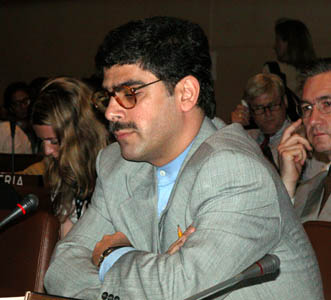 |
|
SCOPE:
|
|
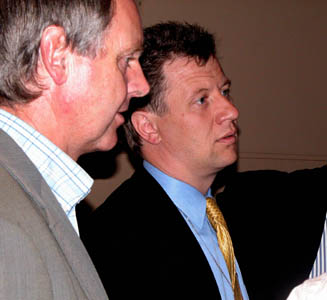
|
|
|
|
NORWAY stated
that the GMA must be based on the ecosystem approach. Above
photo (right): Kjell Kristian Egge (Norway)
|

SOUTH
AFRICA said the GMA should be comprehensive and
avoid creating artificial prioritization and hierarchy.
Above photo: Xolisa Mabhongo (South Africa)
|
|
|
|
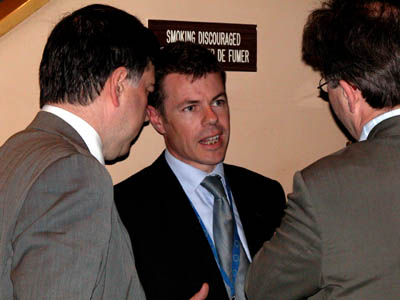 |
 |
|
|
Ireland,
on behalf of the EUROPEAN UNION (EU), stated that the
purpose of the GMA was to improve the scientific understanding
of the oceans for sound decision making and, said it
should not encompass fisheries assessment or management.
Above photo (center): Dellan Smyth (Ireland)
|
AUSTRALIA
underlined that excluding living marine resources from the
GMA would imply failure to respond to the outcomes of the
World Summit on Sustainable Development (WSSD). Above
photo: Max Kitchell (Australia)
|
|
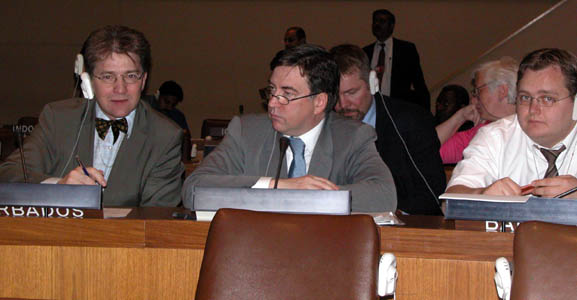 |
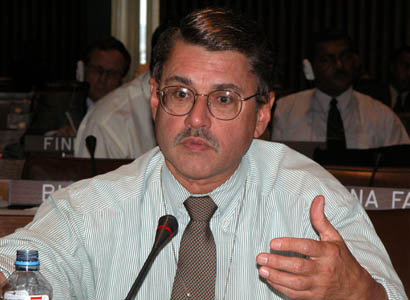 |
|
|
ICELAND
opposed, noting that the JPOI only includes recommendations
a later stage in order to avoid delays in its establishment.
|
The
US stated that the scope of the GMA had been set by
the WSSD. Above photo: Thomas Laughtin (US) |
|
|
Start-up
phase: |
|
|
|
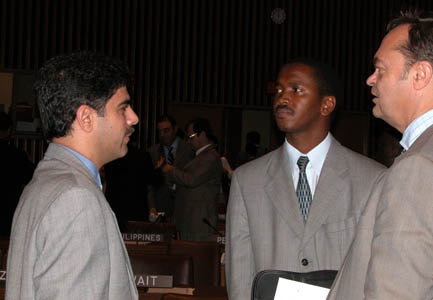
|
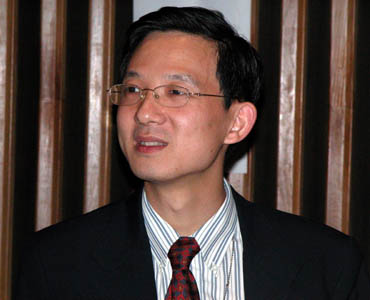
|
|
|
The
G-77/CHINA said the first step should be to identify
challenges and opportunities for enhancing cooperation on
the basis of available resources. Above photo: Hossein
Moeini (Iran), Xolisa Mabhongo (South Africa),
and Vladimir Golitsyn (DOALOS)
|
CHINA
suggested the first stage focus on identifying gaps in
existing assessment mechanisms. Above photo: Yang Li
(China) |
|
|
|
|
|


|

